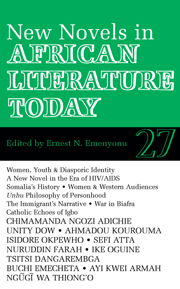Book contents
- Frontmatter
- Contents
- Notes on Contributors
- EDITORIAL ARTICLE: The African Novel in the 21st Century: Sustaining the Gains of the 20th Century
- ARTICLES
- Resurgent Spirits, Catholic Echoes of Igbo & Petals of Purple: The Syncretised World of Chimamanda Ngozi Adichie's Purple Hibiscus
- Ambivalent Inscriptions: Women, Youth & Diasporic Identity in Buchi Emecheta's Later Fiction
- The Interrupted Dance: Racial Memory in Isidore Okpewho's Call Me By My Rightful Name
- The Ivorian Crisis & Ahmadou Kourouma's Posthumous Political Novel Quand on Refuse on dit non
- Ngũgĩ's Wizard of the Crow: Women as the “Voice of the People” & the Western Audience
- The Ankh & Maat: Symbols of Successful Revolution in Ayi Kwei Armah's Osiris Rising
- A New African Youth Novel in the Era of HIV/AIDS: An Analysis of Unity Dow's Far & Beyon'
- The Prison of Nigerian Woman: Female Complicity in Sefi Atta's Everything Good Will Come
- Manufacturing Skin for Somalia's History: Nuruddin Farah's Deep Hurt in Links
- A Zimbabwean Ethic of Humanity: Tsitsi Dangarembga's The Book of Not & the Unhu Philosophy of Personhood
- ‘Coming to America’: Ike Oguine's A Squatter's Tale & the Nigerian/African Immigrant's Narrative
- Chimamanda Ngozi Adichie's Half of a Yellow Sun
- REVIEW
- Index
The Interrupted Dance: Racial Memory in Isidore Okpewho's Call Me By My Rightful Name
from ARTICLES
Published online by Cambridge University Press: 05 April 2013
- Frontmatter
- Contents
- Notes on Contributors
- EDITORIAL ARTICLE: The African Novel in the 21st Century: Sustaining the Gains of the 20th Century
- ARTICLES
- Resurgent Spirits, Catholic Echoes of Igbo & Petals of Purple: The Syncretised World of Chimamanda Ngozi Adichie's Purple Hibiscus
- Ambivalent Inscriptions: Women, Youth & Diasporic Identity in Buchi Emecheta's Later Fiction
- The Interrupted Dance: Racial Memory in Isidore Okpewho's Call Me By My Rightful Name
- The Ivorian Crisis & Ahmadou Kourouma's Posthumous Political Novel Quand on Refuse on dit non
- Ngũgĩ's Wizard of the Crow: Women as the “Voice of the People” & the Western Audience
- The Ankh & Maat: Symbols of Successful Revolution in Ayi Kwei Armah's Osiris Rising
- A New African Youth Novel in the Era of HIV/AIDS: An Analysis of Unity Dow's Far & Beyon'
- The Prison of Nigerian Woman: Female Complicity in Sefi Atta's Everything Good Will Come
- Manufacturing Skin for Somalia's History: Nuruddin Farah's Deep Hurt in Links
- A Zimbabwean Ethic of Humanity: Tsitsi Dangarembga's The Book of Not & the Unhu Philosophy of Personhood
- ‘Coming to America’: Ike Oguine's A Squatter's Tale & the Nigerian/African Immigrant's Narrative
- Chimamanda Ngozi Adichie's Half of a Yellow Sun
- REVIEW
- Index
Summary
The practice that began in Jamestown, Virginia in 1619 of forcibly bringing Africans to perform the exhausting task of working in the American plantations from ‘sun up’ to ‘sun down’, which later blossomed into the transatlantic slave trade that lasted about three centuries, denuded African societies of their most virile members and created the first African diaspora in the Americas. The Africans in this first diaspora were sought after for their physical strength.
The catastrophic collapse of the economies of most independent African nations has in recent times triggered another exodus from the continent. This time, however, the emigration is voluntary and involves the most educated members of the various African states. This brain drain has over the years created a second African diaspora in America and the Western world.
Call Me By My Rightful Name belongs to the growing body of African literature that explores the ramifications of the African presence in the Western world. This novel makes a valuable contribution to the diasporic discourse by examining the important issues of racial memory and the search for one's roots among the Africans in diaspora from two different perspectives: Western (Clinical Psychiatry) and African (Yoruba Ifa). The novel's protagonist, Otis, is an individual with a split personality and dual identities (American and African). He is a normal bubbly American youth until he is destabilized by mysterious drumming only audible to himself.
- Type
- Chapter
- Information
- New Novels in African Literature Today , pp. 28 - 41Publisher: Boydell & BrewerPrint publication year: 2009

